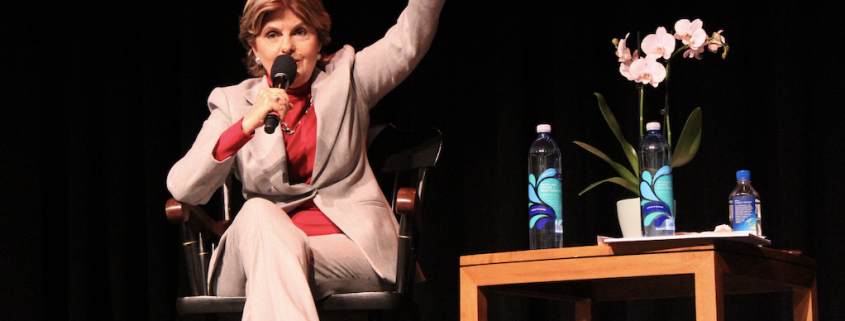SAGE hosts Roe v. Wade event with Gloria Allred

Gloria Allred has always been a rebel. The award-winning lawyer is best known for her contributions to modern-day reproductive rights, but Allred is not done fighting.
The feminist lawyer, who represents several alleged victims of former USC gynecologist George Tyndall, spoke at an event hosted by the Student Assembly for Gender Empowerment to commemorate the anniversary of the landmark Supreme Court case Roe v. Wade, which upholds a woman’s private right to abortion.
The conversation, which was moderated by political science professor Alison Rentln, covered reproductive rights, sexual harassment in the workplace, current #MeToo era court cases and needed progress.
“The attacks on Roe v. Wade have not ceased,” Allred said. “We live in very dangerous times, to put it mildly.”
Before the 1973 court decision, abortion was criminalized and obtaining affordable, safe and legal abortions was not possible. This led many women to seek dangerous and often life-threatening backdoor abortions — just as Allred did after she was raped while on vacation in Mexico in her 20s. Allred said when she returned to California, she did not report the crime and sought an illegal and unsafe abortion.
“I did what millions of women did in those days,” Allred said. “I had the [illegal] abortion and was left to hemorrhage in a bathtub.”
Allred’s own traumatic experience and the lack of support she received inspired her to pursue a career in justice.
“[Restricting access to abortion] is about controlling women so that you don’t have a choice,” Allred said. “Whether [a woman] gets pregnant when she’s a teenager and takes that pregnancy to term, could be the most important economic decision for the rest of her life.”
Even though Roe v. Wade legalized abortion, states can still regulate and restrict women’s access to treatment. Some states, like West Virginia, only have one women’s health clinic.
According to Allred, young women, poor women and women of color are especially vulnerable when safe abortions provided by licensed health care providers and clinics are limited.
While progress has been made, there is still more to be done in order to achieve gender parity, Allred said.
“I don’t look at where we used to be and where we are now,” Allred said. “I look to where we should be, which is enjoying equal rights under the law.”
Allred said that the lack of an Equal Rights Amendment, which was proposed 96 years ago, demonstrates how change still needs to be made. The workplace, in particular, is a breeding ground for sexual misconduct and oppression of women, Allred said.
“There is still so much sexual harassment in the workplace,” Allred said. “It’s about a power dynamic. It’s mostly men in power and they take advantage of those who are not in power and that’s women, who are lower in the workforce.”
As a civil rights litigation attorney, Allred worked on numerous cases involving high-profile men accused of sexual predatory behavior. She represented women who spoke out against film producer Harvey Weinstein and comedian Bill Cosby, filing both criminal and civil cases. At USC, Allred has represented several alleged victims of Tyndall, who is currently under investigation for sexually abusing hundreds of patients over his nearly 30 years as a campus gynecologist.
“These women are very brave,” Allred said. “The cost of the wrong should not be borne by the victim but by the wrongdoer.”
Allred encouraged the women to fight for their rights and men to act as allies and support a vision of equality. Allred said that when she feels unmotivated by the lack of progress in gender equality, she always considers the negative effects of inaction.
“Take that anger and rage, turn it outward into some constructive action to help other people,” Allred said. “Do what Mother Jones said, ‘don’t agonize, organize.’”
Allred called the women in the audience leaders and said that by participating in the discussion, they were getting involved in the movement.
“This is the age of empowerment of women,” Allred said. “We are not going to be silenced anymore. We are not going to live in fear.”

